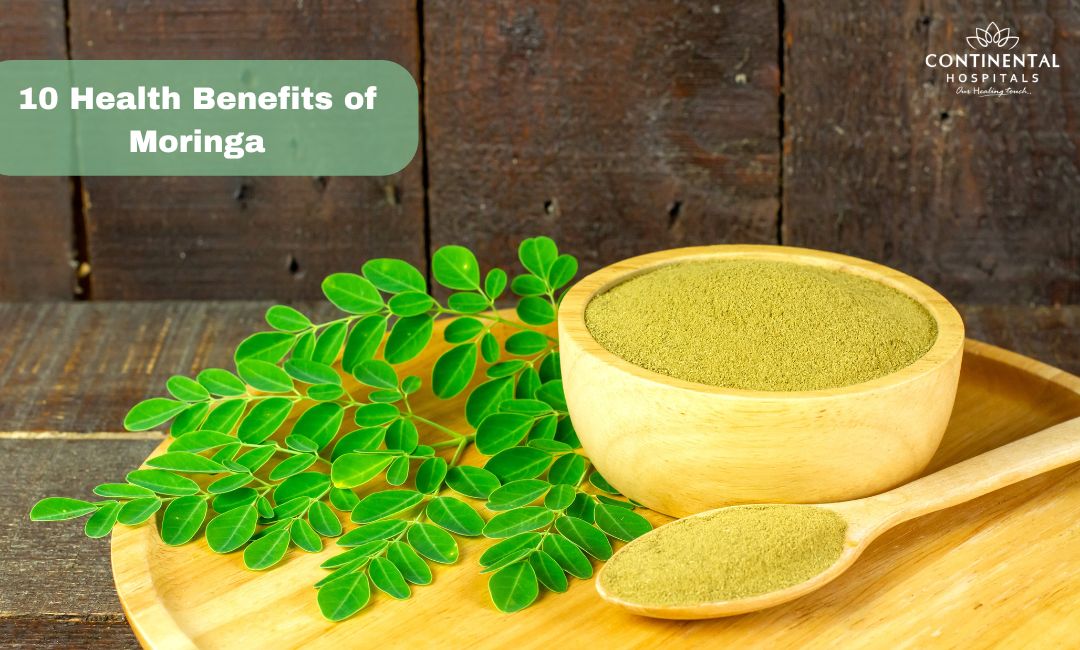Moringa, known as the "miracle tree," offers numerous health benefits. It is rich in vitamins A, C, and E, which boost the immune system and promote healthy skin and vision. High in antioxidants, moringa helps combat oxidative stress and inflammation, reducing the risk of chronic diseases. Its anti-inflammatory properties aid in managing conditions like arthritis. Moringa supports heart health by lowering cholesterol and blood pressure. It helps regulate blood sugar levels, benefiting those with diabetes. The high iron content combats anemia, while the calcium and phosphorus strengthen bones. Moringa's antimicrobial properties fight infections. It also enhances digestive health due to its high fiber content. Additionally, moringa improves brain health and cognitive function through its neuroprotective effects. This nutrient-dense superfood offers a holistic approach to enhancing overall health and well-being.

10 Health Benefits of Moringa
Boosts Immunity
Moringa leaves are packed with essential vitamins such as A, C, and E, which are known for their immune-boosting properties. Vitamin C helps in fighting off infections, while vitamins A and E act as antioxidants, protecting cells from damage and enhancing overall immune function.
Rich in Antioxidants
Moringa contains several powerful antioxidants, including quercetin, chlorogenic acid, and beta-carotene. These compounds help neutralize free radicals in the body, reducing oxidative stress and lowering the risk of chronic diseases such as heart disease and cancer.
Anti-Inflammatory Properties
Chronic inflammation is linked to numerous health problems, including arthritis, diabetes, and cardiovascular disease. Moringa's anti-inflammatory compounds, such as isothiocyanates, quercetin, and chlorogenic acid, help reduce inflammation and alleviate symptoms of these conditions.
Supports Heart Health
Moringa has been shown to have cholesterol-lowering effects, which can help reduce the risk of heart disease. Its high levels of antioxidants also support cardiovascular health by protecting the heart and blood vessels from oxidative damage.
Regulates Blood Sugar Levels
Studies have demonstrated that moringa can help lower blood sugar levels, making it beneficial for individuals with diabetes. The plant contains compounds such as isothiocyanates, which have anti-diabetic effects and help in managing blood glucose levels.
Enhances Digestive Health
The high fiber content in moringa aids in digestion and helps prevent constipation. Additionally, its anti-inflammatory properties can help soothe the digestive tract, reducing symptoms of gastrointestinal disorders.
Combats Anemia
Moringa is an excellent source of iron, which is crucial for producing red blood cells and preventing anemia. Consuming moringa can help increase hemoglobin levels and improve overall blood health.
Strengthens Bones
Moringa is rich in calcium and phosphorus, both essential for maintaining strong and healthy bones. Regular consumption of moringa can help prevent bone-related disorders such as osteoporosis.
Antimicrobial and Antibacterial Properties
Moringa exhibits antimicrobial and antibacterial properties, making it effective against various bacterial, fungal, and viral infections. Its compounds help inhibit the growth of pathogens and support the body's defense mechanisms.
Enhances Brain Health
Moringa contains neuroprotective elements that support brain health and cognitive function. Its high antioxidant content helps protect brain cells from oxidative stress, which can lead to neurodegenerative diseases like Alzheimer's.
Nutritional Value of Moringa
| Nutrient | Amt |
| Calories | 64 kcal |
| Protein | 9.4 g |
| Fat | 1.4 g |
| Carbohydrates | 8.3 g |
| Fiber | 2.0 g |
| Vitamin A | 7564 IU |
| Vitamin C | 51.7 mg |
| Vitamin E | 20.4 mg |
| Calcium | 185 mg |
| Iron | 4.0 mg |
| Magnesium | 147 mg |
| Potassium | 337 mg |
Uses of Moringa
Culinary Uses
Fresh Leaves: Moringa leaves can be used fresh in salads, similar to how spinach or kale is used. They add a nutritional boost and a slightly peppery taste.
Cooked Leaves: The leaves can be cooked like other leafy greens. They are often added to soups, stews, and curries, particularly in Indian cuisine.
Moringa Powder: Dried and powdered moringa leaves are a popular supplement. The powder can be added to smoothies, juices, soups, and baked goods to enhance their nutritional value.
Medicinal Uses
Traditional Medicine: Moringa has a long history in traditional medicine systems such as Ayurveda and traditional African medicine. It is used to treat a variety of ailments, including digestive disorders, inflammation, and infections.
Nutritional Supplements: Moringa powder and capsules are widely used as dietary supplements due to their high content of vitamins, minerals, and antioxidants.
Wound Healing: Moringa leaves and extracts are used to promote wound healing and reduce inflammation. They have antibacterial properties that help prevent infections.
Cosmetic Uses
Skin Care: Moringa oil, extracted from the seeds, is rich in antioxidants and moisturizing properties. It is commonly used in lotions, creams, and serums to hydrate and protect the skin.
Hair Care: Moringa oil is also used in hair products to nourish the scalp, strengthen hair, and promote growth. It helps reduce dandruff and dry scalp conditions.
Anti-Aging: The high vitamin E content in moringa helps fight free radicals, reducing the signs of aging and keeping the skin youthful and radiant.
Conclusion
Moringa is truly a superfood that offers a multitude of health benefits. From boosting immunity and supporting heart health to regulating blood sugar and enhancing brain function, moringa proves to be a valuable addition to any diet. Its diverse applications in culinary, medicinal, and cosmetic fields further highlight its importance. Including moringa in your daily routine can lead to significant improvements in overall health and well-being, making it a worthy addition to your diet.
Related Blog Articles:
.webp)







